God reveals his greatness through the saints. Thus, we came to know the poverty of Jesus seeing the example of Saint Francis of Assisi; the humility of Jesus in the person of Saint Martin of Porres; the sweetness and meekness of the Lord in the example of Saint Francis of Sales and therefore all the saints show us something of the greatness of God.
In the last century, Padre Pio confirmed with his life something of the greatness of the mystery of Christ Crucified. Furthermore, in the manner of many other saints, like St. Philippe Neri, the holy Cure of Ars, and St. Joseph Calfasso, he had the gift of discernment of souls to help them repent. But until then, such a profound testimony about "what happens" during the celebration of the Eucharistic mystery was unknown. We all know that the Holy Mass is the Sacrifice of Christ on the Cross that is renewed in every Mass, every day. But do we realize what that means? Do we repeat it as an abstract definition of Mass? That is why the example of St. Padre Pio of Pietrelcina is so edifying, he who shows us that the Mass is a reality in an active and profound way.
If we want to know what really happens during the Mass, let us remember the testimony of St. Padre Pio: through him, Christ is again giving Himself up to death for us.
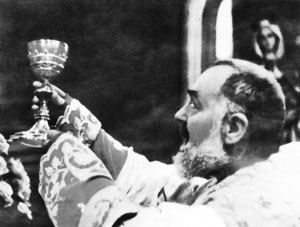 Saint Pio of Pietrelcina shows himself to us as a witness of the supernatural in a special way in the celebration of the Eucharistic Mystery.
Saint Pio of Pietrelcina shows himself to us as a witness of the supernatural in a special way in the celebration of the Eucharistic Mystery.
Padre Pio really lived the mysteries that he celebrated on the altar in his own flesh and soul. The Mass is the bloodless renewal of the Sacrifice of Christ. The Mass is at the same time the sacrifice of praise and thanksgiving, the memorial of the sacrifice offered at the Cross and "real propitiatory sacrifice to mitigate God and make Him favorable to us." This vivid experience of the Mass, sacrifice of Christ, was that of Padre Pio during his 58 years of priesthood. And he, whom God marked with the visible signs of His Passion, celebrated Mass experiencing similar pain — but not the same — as that which Jesus had on the Cross.
Cleonice Morcaldi, one of the spiritual daughters of Padre Pio, asked him several times what he felt and lived in each of his Masses. She wrote carefully each of his answers and thanks to her, we have a unique testimony from the Father himself about his Mass.
– Father, what is your Mass?
– A sacred accomplishment of the Passion of Jesus.
– What should I comprehend in your Holy Mass?
– All of Calvary.
– Father, tell me all that you suffer at the Holy Mass.
 – All what Jesus suffered in his Passion, I inadequately suffer to the extent a human creature can possibly suffer. All of it at no merit of my own and only because of His Goodness.
– All what Jesus suffered in his Passion, I inadequately suffer to the extent a human creature can possibly suffer. All of it at no merit of my own and only because of His Goodness.
– Father, how could we know about your passion?
– In knowing the Passion of Jesus, you will also know mine.
– Do you have the agony of death, Father, like Jesus in the Garden?
– Probably.
– Does the angel also come to comfort you?
– Yes.
– What FIAT do you say?
– The one of suffering, and always to suffer for the brothers in exile and for His Divine Kingdom.
– You also said..."and they will shout: Crucify him, crucify him!" Who will shout?
– The children of men... more precisely the beneficiaries of His death.
– How was Jesus after being scourged?
– The prophet says: "He became as a whole sore. He became like a leper"
– So, you also are like a sore from head to foot?
– And is not this our glory? If there is no place left for more sores, we will make sores on top of sores.
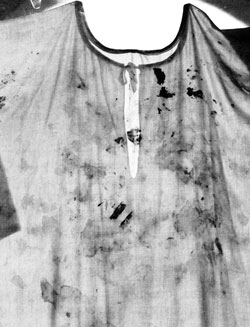 St. Padre Pio’s pajama that shows the marks of blood, caused by the sufferings of the scourging of Our Lord. St. Padre Pio’s pajama that shows the marks of blood, caused by the sufferings of the scourging of Our Lord. |
– My God, this is too much! You are, dear Father, a real executioner of yourself!
– Do not be afraid. On the contrary rejoice in it. I do not want the suffering in itself, no, but the fruits it gives me. It praises God and saves our brothers. What else could I wish for?
– Father. When at night you are scourged, are you alone or does somebody assist you.
– The Holy Virgin assists me, all of Paradise is present.
– Jesus has made me feel that you suffer the crown of thorns.
– Otherwise the immolation would not be complete.
– What sins did Jesus pay for with the crowning of thorns?
– For all, especially those regarding thoughts, not excluding the vain and useless ones.
– Father, do you have the thorns on your forehead or around your head?
– Around the whole head.
– Father, how many thorns does your crown have...Thirty?
– Ah...yes!
– Father, I think that your crown does not have 30, but 300 thorns.
– You get impressed because of a zero! Anyway, is not thirty contained in three hundred?
– Father, is it true that you suffer the torment of the crowning of thorns during the Holy Mass?
– And you doubt it?
– During the whole Mass?
– And also before and after it. The crown is never taken away.
|
He said: "Pray, hope and do not worry. Worries are useless. God is Merciful and will listen to your prayer..." |
– Father, do you also suffer what Jesus suffered during the Way of the Cross?
– Yes. But I wish to do so, in order to arrive at the point of suffering to which the Divine Master arrived.
– Who are your Simon of Cyrene and Veronica?
– Jesus Himself.
– Father, at the Divine Sacrifice, do you take our iniquities on yourself?
– It is impossible to do it differently, as it is part of the Divine Sacrifice.
– So, does the Lord consider you a sinner?
– I do not know. But I am afraid to be so.
– I have seen you trembling when going up the stairs to the altar. Why? Was it because of what you were going to suffer?
– No, not because of what I am supposed to suffer, but because of what I should offer.
– Father, what time during the day do you suffer the most?
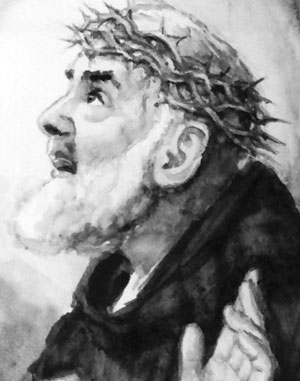 – During the celebration of the Holy Mass.
– During the celebration of the Holy Mass.
– Father, do you also suffer during the day what Jesus allows you to suffer during the Holy Mass?
– I would not feel well! How could I work? How could I do my ministry?
– At which part of the Divine Sacrifice do you suffer the most?
– From the Consecration to the Communion.
– At which moment of the Mass do you suffer the scourging?
– From the beginning to the end, but more intensely after the Consecration.
– Father, why do you almost always cry when you read the Gospel in the Holy Mass?
– And do you find it little thing that a God talks to His creatures, and they react against Him? That he is injured constantly by their ingratitude and incredulity?
The second part of the Mass finds in Padre Pio a liturgist of high class.
Through this singular minister, the Crucified Christ of Golgotha can make happen again the actual, visible and physical incommensurable tragedy of Calvary in a way that a creature is able to do so who is made an efficacious sign of Christ.
In the history of the Sacramental Sign, the stigmatic of Gargano is the only minister, up to this moment, whose flesh also has revealed the Crucified of Golgotha in such a way. In all the centuries in the history of the Church there is no similar case.
– Father, is your Mass a bloody Sacrifice?
– Heretic!
– No. What I want to say that is that the Eucharistic Sacrifice of Jesus is bloodless but your participation in the Passion is bloody. Am I wrong?
– Well… now you are right. Taking it as a personal matter, you might be right.
– Who washes off his own blood during the Mass?
– Nobody.
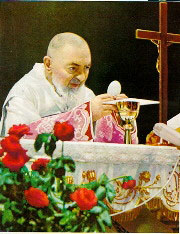 The offertory was another moment that immobilized Padre Pio. It was the outstanding part of his Mass.
The offertory was another moment that immobilized Padre Pio. It was the outstanding part of his Mass.
The Father, with his face full of tears, used to remain immobile, as if transfixed by a mysterious force, his eyes affectionately resting on the crucifix at the altar. He remained still for some minutes, holding the bread and wine in his hands.
– Why do you weep over the offertory?
– Do you want to worm the secret out of me? Well then, it’s the moment when the soul becomes detached from all that is profane.
The Lord used to pull his servant apart to such an extent that it caused him to be insensitive to every profane distraction that occurred.
– Father, the people make noises during the Mass...
– Well, if you would have been at the Calvary, where you heard screams, blasphemies, loud clamor, and threats... that was really an uproar.
– Do you not become distracted because of noises at the church?
– No, absolutely not.
This did not mean that Padre Pio was completely detached from those who were around him participating at the Mass. The total and intimate union with God that Padre Pio had, the moment that his soul was separated from all that was profane, gave to Padre Pio the superhuman possibility of feeling each soul, one by one; all that surrounded the altar.
– Father, are all the souls that attend to your Holy Mass present in your spirit?
– I see all my children who come to the altar, as if in a mirror.
 Padre Pio used to lie down on the Cross of Jesus to consummate the Divine Sacrifice, while carrying all of his children in his heart. The love with which he disposed himself to be immolated was reflected on Padre Pio’s trembling face.
Padre Pio used to lie down on the Cross of Jesus to consummate the Divine Sacrifice, while carrying all of his children in his heart. The love with which he disposed himself to be immolated was reflected on Padre Pio’s trembling face.
The stigmatic from Gargano, amidst tears and sobs, suffering indescribable torment, actualized the Divine Tragedy of Calvary during the Consecration in such a vivid way that the atrocious torment of Jesus Crucified was translucent in his grievously wounded flesh.
– Father, why do you suffer so much at the Consecration?
– You are too cruel!
With these words Padre Pio eluded the answer. A new attack was foreseeable.
– Father, why you suffer so much during the Consecration?
– Because it is at that very moment when a new, awesome and wonderful annihilation and creation happens.
In a brief and concise phrase Padre Pio now says something else. The most exceptional miracle of the Eucharistic conversion is affirmed with assertive clarity. But he says nothing about his sufferings at the altar in the moment of transubstantiation. Padre Pio hides his intimate and secret participation to the new and admirable destruction and creation from view.
It was not only an evasive answer, because he meant to say many things. The query had not been replied to, and so it was necessary to wait for the propitious occasion to reiterate the question to obtain a more complete answer.
– Why do you suffer so much during the Consecration?
– Revealing the secrets of the Supreme King is desecrating them. You ask me why I suffer. I would like to shed not a few tears but abundant tears. Are you not conscious of the tremendous mystery? God, Victim of our sins! And we are His executioners!
The awesome mystery of the Consecration contains the last hours that Christ spent on the Cross. The crucified of Gargano now relives at the altar, one after the other, each of the last moments of the Crucified of Golgotha. Let us keep in mind what the Gospel says about Jesus. Especially at the introduction of the Crucifixion.
– Father, do you suffer the bitterness of gall?
– Yes, very often.
After tasting the gall the most patient son of Saint Francis speaks of his crucifixion at the altar.
– Father, how do you remain upright at the altar?
– The way Jesus used to hold himself on the Cross.
– Do you mean that you are at the altar hanging from the Cross, the way Jesus did at Calvary?
– And you ask me?
– How can you keep yourself upright?
– The way Jesus kept Himself upright at Calvary.
Regarding the Crucifixion he is asked:
– Did the executioners turn the Cross around to clinch the nails?
– Naturally!
– Do they also clinch the nails for you?
– I think so!
– Do they also turn around your cross?
– Yes, but do not be afraid.
The Divine Master, sitting as King on the Divine Throne of His Cross pronounced His last words as a solemn testament of His Merciful Love for us, under the presence of Heaven and Earth.
– Father, do you also speak during Holy Mass the "seven words" that Jesus stated on the Cross?
– Yes, although unworthily, I also speak them.
– And to whom do you say: Woman, there is your Son?
– I tell her: Here are the children of your Son.
– Do you suffer the thirst and rejection Jesus suffered?
– Yes.
– When do you experience thirst and rejection?
– After the Consecration.
– Until when do you suffer thirst and rejection?
– Normally up to the Communion.
– Did the Crucified Jesus have His innermost Being consummated?
– You should rather say burnt.
– For what did the Crucified Jesus thirst?
– For God’s Kingdom.
Padre Pio’s soul burned with the same thirst. Those were extremely dry hours.
Padre Pios`s burning heart did not receive even a drop of consolation.
– You told me you were ashamed of pronouncing this phrase: "I looked for someone to comfort me, but found none." Why?
– Because our suffering is insignificant compared to the real suffering Jesus experienced.
– In front of whom do you feel ashamed?
– In front of God and in front of my conscience.
– Don’t the angels of God console you at the altar where you immolate yourself?
– Well, I do not feel them.
– If your spirit does not receive any comfort during the Divine Sacrifice and if you suffer the complete abandonment as Jesus did, then our presence there is useless.
– The usefulness is for you. If it were the way you say, it could be said that the presence of the Sorrowful Virgin, St. John and the pious women close to the feet of the dying Jesus was useless.
The loving heart torn by the sight of such cruel abandonment, would have liked not to remain passive, but to share such atrocious pain.
– Father, why do not share with us a bit of your Passion?
– The Spouse’s pledge is not given to anybody.
– Tell me what could I do to alleviate your Calvary?
– Alleviate? …say rather to make it harder. We must suffer!
– It is painful to attend your martyrdom being unable to help you!
– Also the Sorrowful Mother attended. There is no doubt that it was a consolation for our Divine Master to have His Mother who, instead of being indifferent, accompanied Him in His pain.
– What did the Virgin do at the feet of the Crucified Jesus?
– She suffered watching her Son suffer. She offered to the Eternal Father her pain and the sufferings of Jesus for our salvation.
It is not surprising that suffering such martyrdom, through becoming completely in possession of the victim, to find more pleasure, concentrates on two highly significant points in the person of Padre Pio.
– On posing this question I am not compelled by curiosity. Which one is the wound that hurts the most?
– The head and the heart.
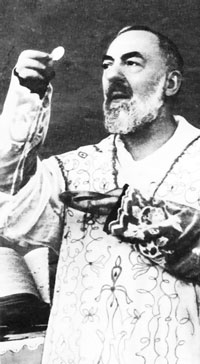 Communion was the summit of Padre Pio`s Mass, the supreme moment of Jesus` Passion.
Communion was the summit of Padre Pio`s Mass, the supreme moment of Jesus` Passion.
Bent towards the altar, holding the chalice in his hands tightly and with the Lord in his heart, the seraphim of Pietricina, completely enraptured, remained for a long time with Jesus, without being conscious of the time.
The Father was asked:
– What is the Sacred Communion?
– It is interior and exterior Mercy. A total Embrace. Do not stop begging Jesus to make Himself sensibly noticed.
– Where does Jesus kiss you?
– He kisses me all over.
– When Jesus comes, does he visit only the soul?
– The entire being.
– What does Jesus do at Communion?
– He delights in His creatures.
– Is Communion an incorporation?
– It is a fusion. Like two candles that fuse together and cannot be distinguished one from the other.
– When you join Jesus in Holy Communion, what should we request the Lord for you?
– To let me be another Jesus, all Jesus, always Jesus.
– You gave me to understand that though the Sacred Species are not consumed in you, through your veins flow the blood of Jesus. Are you a living monstrance?
– You say so!
Jesus, while visiting the entire being of Padre Pio, in fusing with Him in such a wonderful way, He allowed the crucified of Gargano to savor with delight the mystery of His Death, (in the same way He delighted at Calvary, when He sealed the Sacrifice offered to the Eternal Father).
In between accents of great fondness and affectionate love and sorrow, Padre Pio consumed within himself Jesus` sacrifice as well.
– Father, why do you cry when you receive Holy Communion?
– If the Church, when referring to the Incarnation, exclaims: "You did not disdain the bosom of the Virgin." What can we say about ourselves, we as miserable...!
– Do you also suffer during Communion?
– It is the culminating point.
– Do your sufferings continue after Communion?
– Yes, but they are sufferings of love.
– In this union, aren’t you consoled by Jesus?
– Yes, but without leaving the Cross! In that supreme instant a last glance is given.
– Where did the dying Jesus look in His last gaze?
– Towards His Holy Mother.
– And you, where do you turn to?
– Towards my exiled brothers.
"And bowing His head, He gave up His Spirit," writes Saint John about the death of Jesus. It could not have happened otherwise to the crucified of Gargano when he was at the altar.
– Do you also die at the Holy Mass?
– Mystically, at Holy Communion.
– What produces this death in you, is this vehemence for love or for pain?
– Both, but especially for love.
– If you die during Holy Communion, do you stop being at the altar?
– Why? Jesus remained at Calvary when He was dead.
– Father, you told me that at Communion the victim dies. Are you placed in the arms of the Virgin?
– In the arms of Saint Francis.
A pious heart considered the idea that the Sweet Jesus has finally found a soul where to rest with pleasure. This very humble son of St. Francis did not have the same opinion.
– Father, does Jesus take His arms off the Cross to rest on you?
– It is me who rests on Him.
– How much do you love Jesus?
– My desire of loving Him is infinite! But in practice... Poor me! I would be at zero and I am ashamed.
– How will our meeting with Jesus in Heaven be?
– Oh!… The Eucharistic could give us an idea.
Such was Padre Pio`s Mass, and not only men attended it:
– Does the Most Blessed Virgin Mary attend your Mass?
– Do you think the Mother is not interested in Her Son?
– Do angels attend your Mass?
– In legions!
– What do they do?
– Adore and praise.
– Father, who is closest to your altar?
– All of Paradise.
The Holy Mass was over, but in the heart of the stigmatic from Gargano the desire for a continued crucifixion at the altar was not extinguished.
– Would you like to celebrate more than one Mass a day?
– If it depended on me I would never leave the altar.
As the exceptional liturgist could not always stay crucified to the altar, he converted his own person into an altar, trying to make the Passion of Christ always visible.
– You told me you carried the altar with you...
– Yes, to accomplish what the Apostle said: "Taking with me the mortification of Jesus, I am nailed to the Cross", I punish my body and I convert it into a slave.
– So, I am right when saying that Jesus Crucified walks among us! You suffer continually the whole Passion of Jesus!
– Yes, due to His Goodness and Mercy, as much as a human creature is able to.
– How can you work with so much pain?
– I find my rest on the Cross.
Padre Pio asked God: "Make an altar out of me for your Cross" and his pleading was heard, maybe because this request was never before formulated so sincerely and with so much love.
The altar built by the Divine Artist was beautiful, yes, very beautiful... We have not been seen it’s equal in two centuries of Christianity. Doubtless it was the best ever created.
Jesus was captivated by it, the first one that reproduced His Calvary with such fidelity.
In His delight the Stigmatic from Calvary did not want to raise His Cross in that altar. With joy He put Padre Pio there, crucified in His image. Let us meditate now.
– A Mass! Ask an angel — states Padre Pio — what a Mass is and he will answer: I understand what it is and why it is celebrated, but I cannot understand all the value it has. One angel, one thousand angels, all of Paradise thinks the same. And you, you who receive the benefits from it, you do not want to meditate on it?
– When you go to Mass, continues Padre Pio, concentrate to the maximum on the great mystery being celebrated in your presence: "The redemption of your soul and the reconciliation with God."
– Father, does the Lord love the Sacrifice?
– Yes, because with It He has regenerated the world.
– How much glory to God does the Mass give?
– An infinite glory.
– What should we do during the Mass?
– Be compassionate and love.
– Father, how are we supposed to listen to the Mass?
– The way the Blessed Virgin and pious women attended to the tragedy of Calvary. The same way John attended the Eucharistic Sacrifice and the bloody Sacrifice of the Cross.
– What kind of fruits do we receive when we hear the Mass?
– They cannot be enumerated. You will know it only in Paradise.
In the new Heaven and the new Earth that John announced for the end of time, the Holy City will once again be a New Jerusalem, which will descend from heaven, adorned as a wife dressed for her husband. It is the new tabernacle of God among men. God will live amidst His people. The mystic of Patmos also says that the New Jerusalem does not need neither sun nor moon, because it is illuminated by the glory of God. The elected souls who will enjoy that light will have the name of the Lamb engraved on their forehead.
– Father, in Paradise shall we contemplate you crucified?
– For your greater glory.
Comments (1)
Beverly Gallant
reply